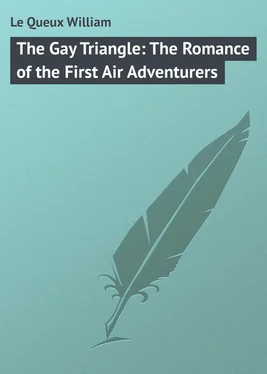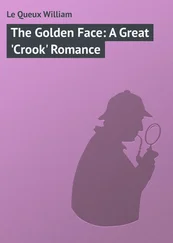William Le Queux - The Gay Triangle - The Romance of the First Air Adventurers
Здесь есть возможность читать онлайн «William Le Queux - The Gay Triangle - The Romance of the First Air Adventurers» — ознакомительный отрывок электронной книги совершенно бесплатно, а после прочтения отрывка купить полную версию. В некоторых случаях можно слушать аудио, скачать через торрент в формате fb2 и присутствует краткое содержание. Жанр: foreign_prose, на английском языке. Описание произведения, (предисловие) а так же отзывы посетителей доступны на портале библиотеки ЛибКат.
- Название:The Gay Triangle: The Romance of the First Air Adventurers
- Автор:
- Жанр:
- Год:неизвестен
- ISBN:нет данных
- Рейтинг книги:5 / 5. Голосов: 1
-
Избранное:Добавить в избранное
- Отзывы:
-
Ваша оценка:
- 100
- 1
- 2
- 3
- 4
- 5
The Gay Triangle: The Romance of the First Air Adventurers: краткое содержание, описание и аннотация
Предлагаем к чтению аннотацию, описание, краткое содержание или предисловие (зависит от того, что написал сам автор книги «The Gay Triangle: The Romance of the First Air Adventurers»). Если вы не нашли необходимую информацию о книге — напишите в комментариях, мы постараемся отыскать её.
The Gay Triangle: The Romance of the First Air Adventurers — читать онлайн ознакомительный отрывок
Ниже представлен текст книги, разбитый по страницам. Система сохранения места последней прочитанной страницы, позволяет с удобством читать онлайн бесплатно книгу «The Gay Triangle: The Romance of the First Air Adventurers», без необходимости каждый раз заново искать на чём Вы остановились. Поставьте закладку, и сможете в любой момент перейти на страницу, на которой закончили чтение.
Интервал:
Закладка:
Le Queux William
The Gay Triangle: The Romance of the First Air Adventurers
Chapter One
The Mystery of Rasputin’s Jewels
From a derelict shed adjoining a lonely road which stretched for miles across the Norfolk fens, a strange shape slid silently into the night mist. It was a motor-car of an unfamiliar design. The body, of gleaming aluminium, was of unusual width, and was lifted high above the delicate chassis and spidery bicycle wheels that seemed almost too fragile to bear the weight of an engine.
Noiselessly the strange car backed out of the shed. There was no familiar teuf-teuf of the motor-engine; so silent was the car that it might have been driven by electricity, save that the air was filled with the reek of petrol.
Swinging round on the grass of the meadow, the car headed for the gateway, turned into the road, and sped along silently for a few miles.
It halted at length at a point where the narrow roadway widened somewhat and ran along an elevated embankment evidently constructed to raise the road above flood-level.
As the car came to rest, two leather-helmeted figures descended from the tiny cockpit in the body of it. One was a slim young fellow of twenty-five or twenty-six; the other, despite the clinging motor costume, showed feminine grace in every movement. It was a young girl, evidently in the early twenties.
The two set busily to work, and in a few minutes their strange car had undergone a wonderful transformation.
From each side shot out long twin telescopic rods. These, swiftly joined together by rapidly unrolled strips of fabric, soon resolved themselves into the wings of a tiny monoplane. From a cleverly hidden trap-door in the front of the car, appeared an extending shaft bearing a small propeller, whose twin blades, hinged so as to fold alongside the shaft when not in use, were quickly spread out and locked into position. A network of wire stays running from the wings to the fuselage of the car were speedily hooked up and drawn taut.
Then the two mysterious figures climbed again into the transformed car. There was a low, deep hum as the propellers began to revolve, the monoplane shot forward a few yards along the road, then lifted noiselessly, and, graceful and silent as a night-bird, vanished into the shrouding mist.
The adventures of the Gay Triangle had begun!
Dick Manton, lounging idly in the Assembly Hall of the little town of Fenways, in the centre of the Norfolk Broads, watched with eyes half critical and half amused the throng of dancers circling gaily to the strains of three violins and a tinkling piano which did duty for an orchestra when the youth of Fenways amused itself with a dance.
Dick was wholly and entirely a product of the war. The lithe, slim body, hatchet face, and keen, resolute eyes stamped him from head to foot with the unmistakable cachet of the airman. He smiled, as he watched the dancers, in acknowledgment of the gay greeting flung to him by a score of laughing girls who, with the joy of youth, were giving themselves unreservedly to the pleasures of the fox-trot.
Dick was a general favourite, and more than one pretty girl in the room would have been only too glad to arouse something more than a passing interest in the young airman, whose dare-devil exploits above the German lines in France had brought him the Flying Cross, whose brilliant career had been cut short by a bullet wound, received in a “dog-fight” above Bethune, which had rendered him unfit for the continual hardships of active service. He had been offered a “cushy” job in acknowledgment of his services. But Dick could not bear the idea of being “in the show” and yet not of it, and had accepted his discharge with what philosophy he could muster.
His chief asset was his amazing knowledge of motor-engines. They had been his one absorbing craze. While in the Army he had studied intently every type of engine to which he could gain access; he had read every book on the subject upon which he could lay his hands, and even among the expert pilots of the Air Force he was acknowledged as a master of engine craft.
It was this knowledge of engines which had sent Dick into the motor business. He knew, of course, that he could have obtained a good post with one of the big companies had he chosen to stay in London. But his nerves were still tingling from the stress of war, and he was still weak from the after effects of his wounds. So, for the sake of peace and fresh air, he had invested a part of his capital in a small motor business at Fenways. If he was not making a fortune he was at least living, and the keen Norfolk air was rapidly bringing him back to health.
At times the longing for the old life, the rash and whirl of the city, came upon him with almost overwhelming force.
Suddenly a cameo of his days in France leapt into his mental vision. He found himself once again staring, as in a mirror, at the slim figure of a half-fainting French girl stealing through the dusk towards the British lines. A crackling volley of shots from the Boche lines followed her, but by some miracle she came on unhurt. Dick had been sent up to the front to supervise the removal of a German plane of a new pattern which had crashed just behind the trenches and had wandered into the front line (where, of course, he had no business!), and it was he who caught the exhausted girl in his arms as she dropped into the British trench.
He had often wondered since what had become of Yvette Pasquet. She had stayed on in the little town where Dick’s squadron was stationed, and they had become good friends. Dick had thus learnt something of her tragic history.
An Alsatian, French to the finger-tips, Yvette had lived in London for some years and spoke English well. But she had seen her father and mother shot down by the Germans on the threshold of their home, and she herself had only been preserved from a worse fate by a young German officer, who had risked his life to save her from his drink-maddened soldiers. Sweet and gentle in all other respects, Yvette Pasquet was a merciless fiend where Germans were concerned; her hatred of them reached a passion of intensity which dominated every other emotion.
How she had managed to get through the German lines she never quite remembered. Her father had been well-to-do, and before her escape after the final tragedy, Yvette had managed to secure the scrip and shares which represented the bulk of his fortune, and had brought them across with her safely concealed under her clothing.
From that time forward she had been the brain of a remarkable organisation which had devoted itself to smuggling from the occupied regions into France gold, jewellery, and securities, which had been hidden from the prying eyes of the Hun.
After his wound Dick had lost sight of her. For many months he had lain dangerously ill, and when he had recovered sufficiently to write, Yvette had disappeared.
Dick’s reverie was broken at length by a light touch on his arm. “A penny for your thoughts!” said a soft voice at his elbow.
Dick came to earth with a jerk. The voice was that of Yvette herself! And when he turned he found her standing beside him, smiling into his face with the light of sheer mischief dancing in her brilliant eyes. With her was a tall young Frenchman, obviously her brother.
“Yvette!” Dick gasped in sheer amazement. “What on earth brings you here?”
“I came to look for you, my friend,” was the quaint but sufficiently startling reply in excellent English. “But let me present my brother. Jules – this is Mr Manton.”
Dick, his head in a whirl, mechanically acknowledged the introduction. Yvette had come to look for him! What could it mean?
“We came down from London this evening,” Yvette explained, “and are staying at the ‘George.’ We soon found your rooms, and hearing you were here decided to give you a surprise.”
Читать дальшеИнтервал:
Закладка:
Похожие книги на «The Gay Triangle: The Romance of the First Air Adventurers»
Представляем Вашему вниманию похожие книги на «The Gay Triangle: The Romance of the First Air Adventurers» списком для выбора. Мы отобрали схожую по названию и смыслу литературу в надежде предоставить читателям больше вариантов отыскать новые, интересные, ещё непрочитанные произведения.
Обсуждение, отзывы о книге «The Gay Triangle: The Romance of the First Air Adventurers» и просто собственные мнения читателей. Оставьте ваши комментарии, напишите, что Вы думаете о произведении, его смысле или главных героях. Укажите что конкретно понравилось, а что нет, и почему Вы так считаете.












